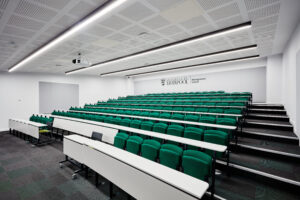How you'll learn
Teaching is by a mix of formal lectures, small group tutorials and supervised laboratory-based practical sessions. Students also undertake individual and group projects. Key problem solving skills and employability skills, like presentation and teamwork skills, are developed throughout the programme.
How you're assessed
The main modes of assessment are through a combination of coursework and examination. Depending on the modules taken you may encounter project work, presentations (individual or group), and specific tests or tasks focused on solidifying learning outcomes.
Liverpool Hallmarks
We have a distinctive approach to education, the Liverpool Curriculum Framework, which focuses on research-connected teaching, active learning, and authentic assessment to ensure our students graduate as digitally fluent and confident global citizens.
The Liverpool Curriculum framework sets out our distinctive approach to education. Our teaching staff support our students to develop academic knowledge, skills, and understanding alongside our graduate attributes:
- Digital fluency
- Confidence
- Global citizenship
Our curriculum is characterised by the three Liverpool Hallmarks:
- Research-connected teaching
- Active learning
- Authentic assessment
All this is underpinned by our core value of inclusivity and commitment to providing a curriculum that is accessible to all students.










